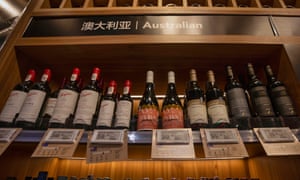23:51
On the Australian government’s request for one million AstraZeneca doses to be made available for Papua New Guinea, a spokesperson for the European Union has told Guardian Australia this afternoon:
We confirm that the President of the European Commission has received a letter from the Australian prime minister on this topic and we will reply in due time.
Updated
23:35
Chinese embassy to push back at Xinjiang criticism
Readers may have seen that Scott Morrison was asked this morning about a planned press conference arranged by the Chinese embassy, which is due to start at 2pm Canberra time.
I’ll be heading along to the event and will file news afterwards. But the 90-minute press conference is expected to include some sort of video hook-up with officials from the Xinjiang region, where China has been accused of gross human rights abuses against Uyghurs and other Muslim minorities. The Canadian and Dutch parliaments and the US government have described the situation in Xinjiang as genocide.
The fact the Chinese embassy in Australia has arranged this event suggests it is eager to push back at the growing international criticism of what is going on in Xinjiang. Chinese officials have previously argued that its conduct in Xinjiang is “above board”.
Morrison did not comment specifically on Xinjiang in this morning’s presser, but said the world was “a lot more uncertain at the moment than it has been for a long time”. The prime minister said while he wanted a positive relationship with China, Australia would also act “in accordance with its values and its national character – and that will never be, that will never be something that we would yield for the sake of a relationship”.
Updated
23:02
Australia needs to manage China relationship and diversify export markets – report
Australia needs to manage the increasingly complex relationship with China, even as the government seeks areas to diversify its export markets, according to a new report out this afternoon.
The Asia Taskforce – which includes the Business Council of Australia and Asia Society Australia – calls for a target of boosting Australia’s exports to 35% of GDP by 2030 (up from 29% in 2019).

The report says Australian business now “stands at a crossroads”. It says not since the 1970s, when the UK turned towards Europe, “have we witnessed a major re-alignment in how we trade and invest in the world”.
The taskforce, which also involves consultants PwC and the University of Sydney’s business school, argues the disruption of Covid-19 also brings forward stark choices, as “protectionist policies that seemed unthinkable a year ago are creeping back”.
Popular support for the open economy cannot be taken for granted. Retreating to old familiar relationships in western markets, falling behind in Asia literacy and failing to build connections with new Asian business partners should not be seen as a serious default choice when consumption in Asia will likely fuel future global growth.
The report backs the need to diversify Australia’s export markets, but says this does not mean abandoning the economic relationship with China, the largest trading partner. It says diversification for Australia means trading with China will also build up other relationships in the region.
The report – titled A second chance: How Team Australia can succeed in Asia – says that “learning to navigate a more complex relationship with China is imperative and efforts to ensure both countries engage constructively must be a priority”.
Other recommendations include adopting a “Team Australia” approach to developing new opportunities; play to our strengths by adopting country sector strategies; rebooting Asia literacy; and championing the talent in our Asian-Australian and diaspora communities.
The trade minister, Dan Tehan, is expected to launch the report at an event in Canberra later today.
Updated









